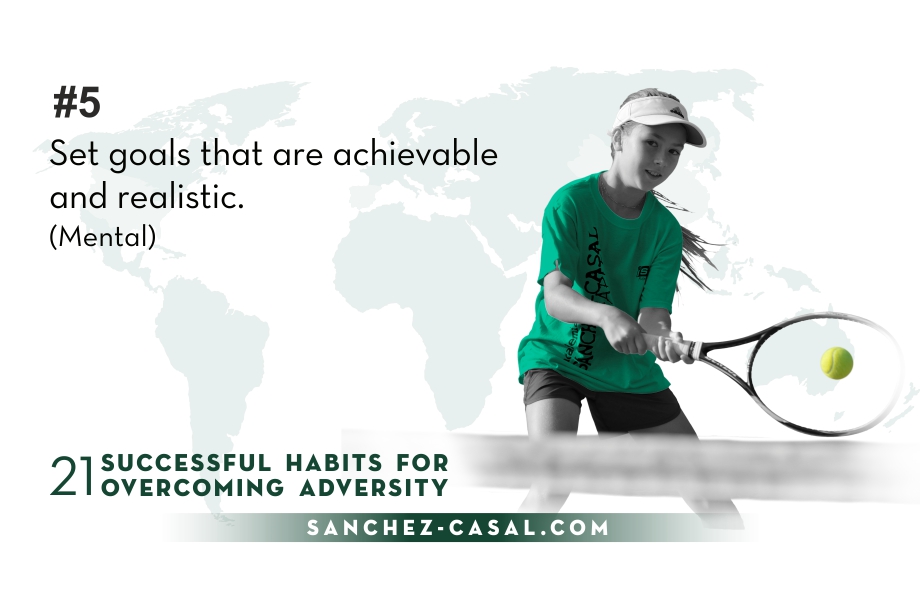
By Emilio Sánchez Vicario, CEO & Founder at Sánchez-Casal Academy.
# 5 Set goals that are achievable and realistic. (Mental)
When we speak of challenges and achievements in sports, we tend to fix on the stories and anecdotes which have the sporting elite at their heart. Great deeds that are accomplished with clear goals turn the most well-known athletes into legends, almost heroes. But sport is also full of smaller-sized heroes, young athletes who work every day for what they want, and who are also great examples of success. Why can it not be in training that people work on the values and habits that translate the skills learnt in competitive sport to the real world?
The main character of this story is an alpine skier. I met him when I was ten years old and I was already set on going to the Olympic Games and being like Bode Miller. What child doesn’t dream of competing, in whatever sport they play, and winning? Our skier was in his last year of Alevín. The following year he started to participate in official federate competitions – an important step for any athlete.

In that moment, the expectations of our skier were high, and the season started well. He finished several races in a good position – in the first 10. But half way through the season he had an accident during a race and from that point onwards, his season made a turn for the worse. He lost self-confidence, in every new race he tried to recuperate his position in the ranking, but probably because his style was forced, and he was taking too many risks, he fell in ALL of the races in the rest of the season! He knew that the next year was important. He was part of a competitive club and they “demanded” results.
This is the point at which to reflect and create realistic and achievable goals.
In the following season, his objective is simple: “not to fall”, and to finish all the races without worrying about his final position. The underlying aim was to recuperate his self-confidence and to find what we would call in other sports “his game”. This could look like an easy objective from the outside, but is it really easy for a 11-12 year old boy? Everyone wants to step up onto the podium, and focusing on a “modest” objective can be seen as giving up on victory, even more so in highly-pressured environments. It’s vital to make mature and well-guided decisions. The . in this regard.

But clearly, his objective didn’t end there. The upcoming year was when he should be unleashing his potential. His objective was to qualify for his country’s national competitions, and for this, he needed to be in the top 14 of his regional ranking.
At the end of the second year, our skier took stock. They’d been difficult years, working through a period of maturity during which the character, personality, and particularly hormones, were rebelling against everything. It’s the moment when one begins to doubt the advice of parents, trainers, even oneself. But the rigor of the sport and its values made it possible for a child who was 13 years old to have a mature plan, based on calculated efforts both in work, and in discipline.
The evaluation was a good one: the objective of the first year, “cross the finish line”, achieved. Second objective, “qualify for the National Cup”, achieved, even if he didn’t manage to stay in until the end of the competition.
This was the moment to set out the next challenge, knowing that the following year would be tough, as he would be competing against runners up to 2 years older than him. Time to get back to planning a realistic objective: to remain in the top 30. He worked hard throughout the season, making an extra effort to train another day during the week as well as the weekend, which also involved making an extra effort academically to keep up with school work. What happened at the end of the season? It was a year in which he’d experimented with rapid physical growth, found it difficult to channel strength and lost some coordination. He finished in position 40 of the ranking.

Here ends the story of our young skier. Is he doing ok? Can we say that he’s a good skier? Is he a good sportsman? In this case, it’s very clear that setting achievable goals is helping him to keep going in a highly competitive environment. If he had set his mind on finishing in the first positions, the frustration would have probably ended up overcoming him. How many young boys and girls give up the sport they play because the demand is too much in relation to the reward? How many abandon sport because they don’t achieve what is expected of them? In a period of growth (pre-adolescence and adolescence) that is particularly difficult, our young boy has clear objectives and has assumed an admirable attitude in the face of difficulties: resilience, efforts, the ability to overcome adversity.
Is this not the real lesson that the majority of young sports players carry with them for the rest of their lives? Focusing on achievable and realistic objectives will help them to persist in their efforts. It’s our duty as the coaches and parents of children who play competitive sport to accompany, guide and motivate them.
Very few young sports players will become professionals. Very few of them will be Olympians, or even will be selected for their country’s national competitions, but their efforts is what makes them great sports players.
Emilio Sánchez Vicario
CEO & Founder at Sánchez-Casal Academy















